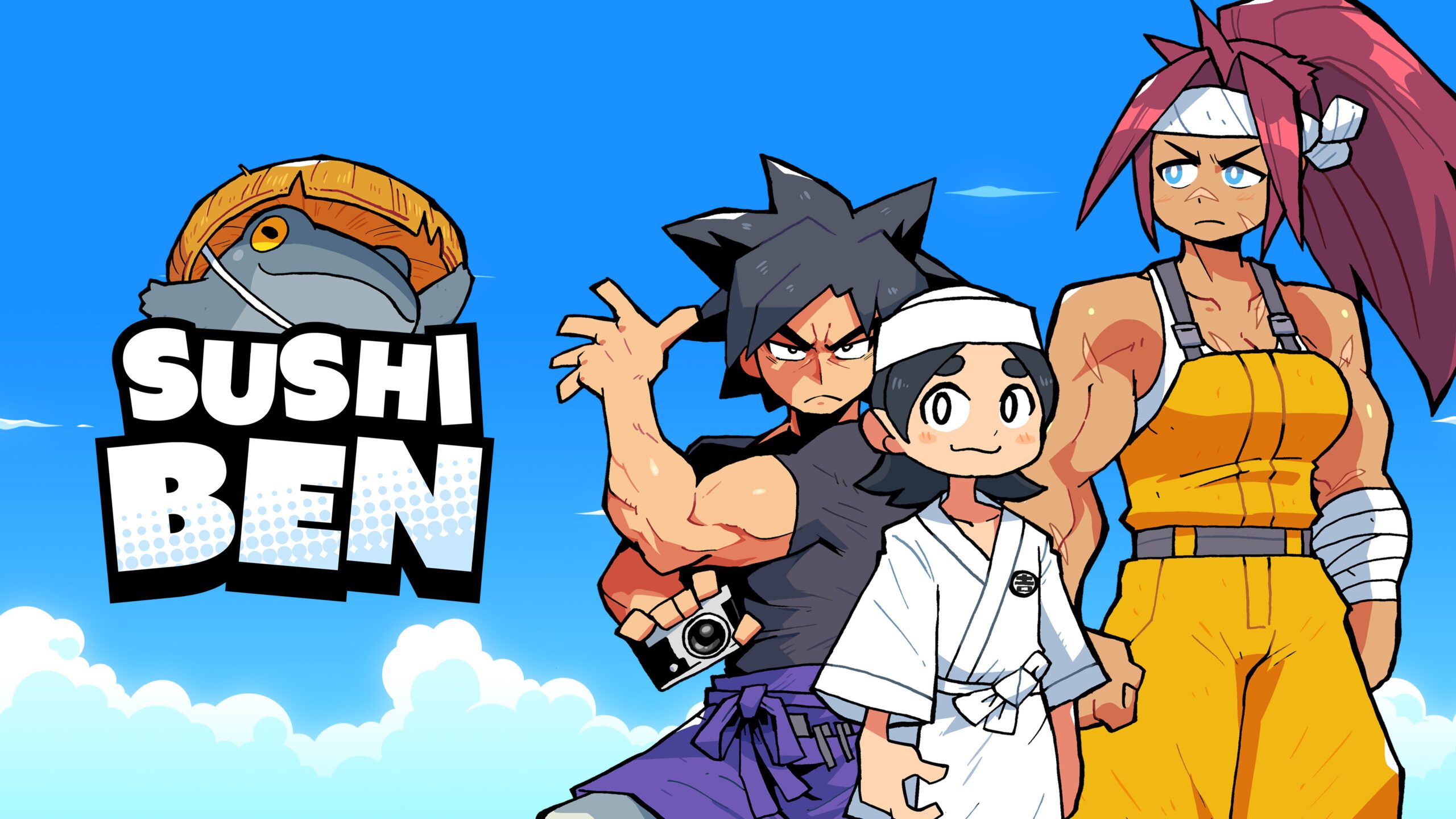
Fancy a cozy adventure in a stunning locale? Inspired by real-life experiences, Sushi Ben drops you into an idyllic seaside town rich with addictive mini-games and curious characters across an anime-inspired slice-of-life sim.

I’m excited for the chance to give players insight into what to expect in Sushi Ben and announce that the game launches May 28 for PlayStation VR2. I’ll also include some additional insights on the creation of this game from Big Brane co-founder Kane Tyler, who first conceived the idea of Sushi Ben as part of his college thesis.
Mini slices of life
In Sushi Ben, players are tasked with saving a sushi bar from going out of business as a group of land developers try to buy up all the property in town. You will assist the townsfolk with various activities and tasks to cultivate business.
As one would expect, Sushi Ben has a wonderful fishing game at its core. As you develop relationships with the locals and complete quests, you’ll fish for the particular type each customer wants so that you can bring their business into the restaurant. That’s only the tip of the iceberg, though.
The townsfolk have unique motivations and desires and, thus, have a wide range of mini-games for players to engage with. There’s table tennis, stone carving, bug catching, dog walking, archery, and more. Each one takes advantage of the dynamic movements that make virtual reality gaming immersive and exciting, challenging players to get moving and use their hand-eye coordination in fun ways.
Storytelling in virtual reality
We at Big Brane hope players are captivated by how the story is told. The freedom of VR, where players have a perpetually unlocked ability to look anywhere at any time, creates some challenges when directing focus. To attract the player’s eye, you must make things stand out, and that’s where our dynamic manga panels come into play.
The thesis specifically focused on filmmaking techniques in virtual reality, which is a significant challenge given that the player is the camera. It’s our job then to provide visual clues and guidance, and Kane, while watching JoJo’s Bizarre Adventure, was suddenly inspired by the idea of manga panels. Using manga panels as a dynamic focal point for VR users became the driving force behind the thesis.
The pursuit of authenticity
Sushi Ben’s seaside village is inspired by thousands of hours of research and by Kane’s time working at a sushi bar with a Chef named Takayuki “Ben” Okuda. When the pandemic prevented many from traveling globally, Kane invested tons and tons of hours into using Google Maps to explore the world and find particular elements that could feed into this authentic representation of a seaside town in Japan, but inspired by the home-town feel of Kane’s neighborhood in Savannah, Georgia.
Sushi Ben is written by Hato Moa, writer of the indie hit Hatoful Boyfriend. Kane dreamed of bringing in voice actors he was a fan of from different anime. Still, he put control of this effort in Hato Moa’s hands because she was in Japan and had the experience and familiarity to get the right people for the gig. It just so happened that Moa shared the same goals, agreeing to their ideal cast in unison. The game’s script blew away the voice actors. Moa, Kane, and the crew ran with their enthusiasm.
Features and accessibility
From the start, the game was designed to be approachable for any VR player – new or experienced. In addition to featuring a gameplay experience with a serene and interesting setting and cozy mini-games, Sushi Ben also has features for VR players that address player comfort and ability. There are options for sitting and standing players, and for those who choose to sit or are differently abled, there’s a height adjustment that allows you to remain seated but have the perspective come from a taller point of view.
For those desiring different degrees of comfort with VR, there are various settings like full locomotion and teleportation options for movement and snap turning or smooth rotations. In addition, dialogue can be set to autoplay, or players can enjoy the Story Mode, which skips the game portions entirely, allowing them to focus on the narrative. This and many other settings can be changed anytime to accommodate every player’s desired experience.
Sushi Ben takes advantage of a few features as it comes over to PS VR2, enhancing the visual quality, and giving players a more immersive experience with detailed haptics.
On May 28, we at Big Brane hope that PS VR2 players feel the authentic joy the development team sought to achieve with Sushi Ben. This joy is mirrored by and built upon the pursuit of authenticity in the story, setting, voice acting, writing, and beyond.
Fancy a cozy adventure in a stunning locale? Inspired by real-life experiences, Sushi Ben drops you into an idyllic seaside town rich with addictive mini-games and curious characters across an anime-inspired slice-of-life sim.

I’m excited for the chance to give players insight into what to expect in Sushi Ben and announce that the game launches May 28 for PlayStation VR2. I’ll also include some additional insights on the creation of this game from Big Brane co-founder Kane Tyler, who first conceived the idea of Sushi Ben as part of his college thesis.
Mini slices of life
In Sushi Ben, players are tasked with saving a sushi bar from going out of business as a group of land developers try to buy up all the property in town. You will assist the townsfolk with various activities and tasks to cultivate business.
As one would expect, Sushi Ben has a wonderful fishing game at its core. As you develop relationships with the locals and complete quests, you’ll fish for the particular type each customer wants so that you can bring their business into the restaurant. That’s only the tip of the iceberg, though.
The townsfolk have unique motivations and desires and, thus, have a wide range of mini-games for players to engage with. There’s table tennis, stone carving, bug catching, dog walking, archery, and more. Each one takes advantage of the dynamic movements that make virtual reality gaming immersive and exciting, challenging players to get moving and use their hand-eye coordination in fun ways.
Storytelling in virtual reality
We at Big Brane hope players are captivated by how the story is told. The freedom of VR, where players have a perpetually unlocked ability to look anywhere at any time, creates some challenges when directing focus. To attract the player’s eye, you must make things stand out, and that’s where our dynamic manga panels come into play.
The thesis specifically focused on filmmaking techniques in virtual reality, which is a significant challenge given that the player is the camera. It’s our job then to provide visual clues and guidance, and Kane, while watching JoJo’s Bizarre Adventure, was suddenly inspired by the idea of manga panels. Using manga panels as a dynamic focal point for VR users became the driving force behind the thesis.
The pursuit of authenticity
Sushi Ben’s seaside village is inspired by thousands of hours of research and by Kane’s time working at a sushi bar with a Chef named Takayuki “Ben” Okuda. When the pandemic prevented many from traveling globally, Kane invested tons and tons of hours into using Google Maps to explore the world and find particular elements that could feed into this authentic representation of a seaside town in Japan, but inspired by the home-town feel of Kane’s neighborhood in Savannah, Georgia.
Sushi Ben is written by Hato Moa, writer of the indie hit Hatoful Boyfriend. Kane dreamed of bringing in voice actors he was a fan of from different anime. Still, he put control of this effort in Hato Moa’s hands because she was in Japan and had the experience and familiarity to get the right people for the gig. It just so happened that Moa shared the same goals, agreeing to their ideal cast in unison. The game’s script blew away the voice actors. Moa, Kane, and the crew ran with their enthusiasm.
Features and accessibility
From the start, the game was designed to be approachable for any VR player – new or experienced. In addition to featuring a gameplay experience with a serene and interesting setting and cozy mini-games, Sushi Ben also has features for VR players that address player comfort and ability. There are options for sitting and standing players, and for those who choose to sit or are differently abled, there’s a height adjustment that allows you to remain seated but have the perspective come from a taller point of view.
For those desiring different degrees of comfort with VR, there are various settings like full locomotion and teleportation options for movement and snap turning or smooth rotations. In addition, dialogue can be set to autoplay, or players can enjoy the Story Mode, which skips the game portions entirely, allowing them to focus on the narrative. This and many other settings can be changed anytime to accommodate every player’s desired experience.
Sushi Ben takes advantage of a few features as it comes over to PS VR2, enhancing the visual quality, and giving players a more immersive experience with detailed haptics.
On May 28, we at Big Brane hope that PS VR2 players feel the authentic joy the development team sought to achieve with Sushi Ben. This joy is mirrored by and built upon the pursuit of authenticity in the story, setting, voice acting, writing, and beyond.






